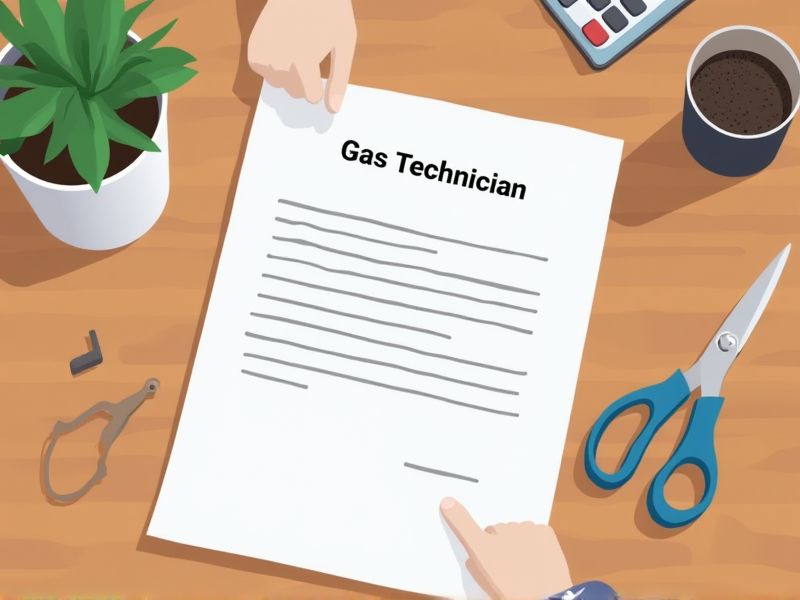
Gas technicians play a crucial role in maintaining and repairing gas heating systems, ensuring safety and efficiency in both residential and commercial settings. The nature of their work involves handling potentially hazardous materials and systems, necessitating a thorough understanding of safety protocols and technical procedures. Proper certifications verify a technician's ability to work safely and effectively, instilling confidence in both clients and regulators. Here are some key certifications that may be necessary for a gas technician.
Gas Technician Certification
Gas Technician Certification ensures that individuals have received adequate training to handle gas systems safely, reducing the risk of accidents. The certification signifies that technicians understand regulatory compliance, which is crucial for meeting industry standards. With a certification, technicians are more likely to correctly diagnose and repair gas-related issues, increasing efficiency and customer satisfaction. Employers prefer certified technicians as it represents a guarantee of skill, reliability, and professionalism in the field.
Gas Piping Installation Certification
Gas piping installation certification ensures that a gas technician has the requisite knowledge and skills to work safely with gas systems. Accidents and leaks in gas systems can lead to severe consequences, including explosions, which the certification helps mitigate by promoting standardized installation practices. Certified technicians are more likely to adhere to industry regulations, reducing liabilities for both contractors and clients. Certification also enhances trust and credibility in the eyes of clients, leading to potentially more job opportunities for technicians.
Natural Gas Safety Certification
Gas technicians need Natural Gas Safety Certification because it ensures they have the necessary knowledge to handle gas systems safely and effectively. This certification reduces the risk of accidents by teaching technicians how to identify and mitigate potential hazards. With proper certification, technicians are more likely to comply with industry regulations and standards, minimizing legal and financial liabilities. Certified technicians contribute to enhanced public confidence in the safety and reliability of gas services.
EPA Section 608 Certification
EPA Section 608 Certification is required for gas technicians to ensure they understand how to handle refrigerants safely, thereby preventing harm to the environment. This certification ensures compliance with federal regulations concerning ozone-depleting substances. Without proper certification, technicians risk causing leaks that contribute to ozone layer depletion. Obtaining this certification is mandatory for legally performing installation, maintenance, or repairing work on refrigeration systems.
OSHA 10-Hour Safety Certification
OSHA 10-Hour Safety Certification reduces workplace accidents by educating gas technicians on potential hazards. Understanding safety protocols decreases the likelihood of gas leaks and explosions, enhancing job site safety. Employers benefit from lower insurance costs due to compliance with industry safety standards. Certification ensures technicians are better equipped to handle emergency situations, minimizing risk and downtime.
OSHA 30-Hour Safety Certification
The OSHA 30-Hour Safety Certification enhances a gas technician's understanding of workplace safety standards, reducing the likelihood of accidents. It educates technicians on hazard recognition, particularly important in high-risk environments like those involving gases. The certification ensures compliance with federal safety regulations, thereby safeguarding both the employee and employer from potential legal issues. Employers often require this certification to demonstrate a technician's commitment to maintaining a safe and efficient work environment.
ASME Boiler and Pressure Vessel Certification
The ASME Boiler and Pressure Vessel Certification ensures that equipment meets stringent safety and quality standards, preventing potential hazards associated with gas handling. For gas technicians, this certification verifies the reliability and efficiency of the equipment they install or maintain, reducing the risks of malfunctions. Regulatory compliance is a mandatory requirement in many regions, and possessing the ASME certification demonstrates adherence to legal standards. Achieving this certification enhances a technician's credibility and increases their employability in the competitive job market.
NFPA 54 Certification
Obtaining NFPA 54 Certification for a gas technician ensures adherence to the National Fuel Gas Code, which directly impacts safety standards when handling gas systems. This certification provides technicians with the knowledge to prevent accidents related to gas leaks and improper installations. Employers often require this certification as it demonstrates a technician's competence in managing and servicing gas appliances effectively. Certification reduces liability risks for companies, promoting a safer working environment and compliance with state regulations.
NFPA 58 Certification
NFPA 58 Certification establishes a standardized level of safety and operational knowledge necessary for gas technicians handling propane systems. It reduces the risk of accidents and ensures compliance with national safety regulations, which protects both technicians and consumers. Being certified can enhance a technician's credibility and employability in the industry. Mastery of NFPA 58 guidelines also equips technicians to efficiently diagnose and address potential issues in propane storage and handling.
First Aid/CPR Certification
Gas technicians frequently work in hazardous environments where accidents can occur, increasing the risk of injuries. First Aid/CPR certification equips them with the knowledge and skills to respond effectively to emergencies, potentially saving lives. Proper immediate response can reduce the severity of injuries and ensure timely medical attention. Companies may also require certification as part of safety protocols, enhancing overall workplace safety compliance.
Summary
By obtaining certifications, you enhance your expertise and become more attractive to employers. Certification often leads to higher earning potential and job security within the energy sector. Your competence in handling gas systems can also reduce workplace incidents, benefiting both safety and operational efficiency. Achieving recognized credentials significantly boosts your professional reputation and career advancement opportunities.
